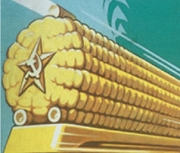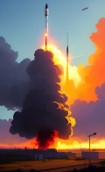|
That they think they could do this without a revolution is probably what would trigger one.
|
|
|
|

|
| # ? May 26, 2024 02:32 |
|
Frosted Flake posted:That they think they could do this without a revolution is probably what would trigger one. Nah, you just got to whip those conscripts harder like the Tsar.
|
|
|
|
Come for the dysfunctional planes and debt-ridden soldiers,stay for the socio-philosophical essays and the history lessons. Man I love this thread.
|
|
|
|
Frosted Flake posted:That they think they could do this without a revolution is probably what would trigger one.
|
|
|
|
There were 2.2 Million draftees in Vietnam. As of 2020 there were 5.5 million people under the supervision of adult correctional systems in the United States. I think the idea of massively expanding the jail to conscript pipeline would be far more appealing politically than reinstating the draft. For one, since we’ve massively expanded the part of our population we imprison, we won’t suffer the same quality issues similar programs have seen in the past. It fits the neoliberal concept of a just world so well, going to war will finally give the unhoused “skin in the game.” And of course you could even structure it so it is all “voluntary.” Would you rather serve 5 years in a private prison for the crime of felony camping on the side of the road, or “volunteer” to fight and get to eat something other than nutraloaf?
|
|
|
|
I was too lazy to post this before, but since the topic of conscription brought itself up again. Well honestly, I think only part 4 is somewhat relevant to this thread, but I wasted time translating the other 3, so it's there for context. I probably shouldn't have bothered. But whatever.𝐀𝐓𝐎𝐌𝐈𝐂 𝐂𝐇𝐄𝐑𝐑𝐘 posted:Mobilization reserves and its problems (part I) 𝐀𝐓𝐎𝐌𝐈𝐂 𝐂𝐇𝐄𝐑𝐑𝐘 posted:Mobilization reserves and its problems (part II) 𝐀𝐓𝐎𝐌𝐈𝐂 𝐂𝐇𝐄𝐑𝐑𝐘 posted:Mobilization reserves and its problems (part III) 𝐀𝐓𝐎𝐌𝐈𝐂 𝐂𝐇𝐄𝐑𝐑𝐘 posted:"Not counting two or three countries on the planet, majority of them are experiencing problems producing not only weapons systems - for example mortars - but even bullets".
|
|
|
|
cat botherer posted:Sure, but you're talking an actual revolution at that point, which probably means the original reasons for a foreign war are moot. very often foreign wars follow revolutions. and not all revolutions happen with force. and other possibilities like existential crisis could potentially cause it too. Frosted Flake posted:That they think they could do this without a revolution is probably what would trigger one. well we make the folks to do it. it’s like massive sealifts. we make those folks and just keep lists of them in cushy reserve programs nobody pays attention to. here’s what I think would trigger it. another country assuming we can’t do it anymore and acting on that assumption.
|
|
|
|
As for the 1917 revolutions. Russians do like to remind everyone these days that it was a bourgeoisie revolution that overthrew the Tsar. So honestly in USA it's probably various corporations that would try to tear down the federal government for cutting into their profits and interrupting trade with China more than somebody in the south getting upset at big guberment again.
|
|
|
|
I do remember reading an article in 2004/2005 about how the Iraq War was causing an ammunition shortage in the US and how some police departments couldn't refill the stocks because the army was buying everything they could get.
|
|
|
|
Oh, maybe this one is slightly more relevant.𝐀𝐓𝐎𝐌𝐈𝐂 𝐂𝐇𝐄𝐑𝐑𝐘 posted:"Same with total war. You can take people out of the economy and services, and that way you'll sink the country, and the government. Simply because this will contract many, today essential, areas."
|
|
|
|
Bar Ran Dun posted:
Isn't it too late at that point?
|
|
|
|
Frosted Flake posted:Conscript armies are more closely linked to popular participation in politics (and thus economics) because going to war is a political act. This is literally the foundation of conscription in the west. I mean, the entire notion of Citizen-Soldiers, from the French Republic on. You go to war for the state because you are directly involved in the state, there is a common purpose, welfare etc. It's why, for example, the CSA conscription system basically collapsed into desertion by 1863: The Slaveholder's Republic was not one where poor whites felt they had political control of the distribution of resources or direction of the war, so they voted with their feet. The Southern aristocracy massively over-participated in the military, which ours are sure to do the opposite of, and that still was not enough. drat this post owns
|
|
|
|
Fell Mood posted:Isn't it too late at that point? it depends. to some extent one can see some changes already happening as a result of the Ukraine war, action causes reaction. I mean it depends on the specifics of the event.
|
|
|
|
Trabisnikof posted:There were 2.2 Million draftees in Vietnam. As of 2020 there were 5.5 million people under the supervision of adult correctional systems in the United States. Some problems with this: Felons in the US can't vote. That means they're not part of the body politic. There's no reason for them to defend a state that excludes them from all decision making including even the ability to vote for candidates who will repeal camping laws. The bottom line? Unless it's a promise of a full restoration of citizenship, improvement of material conditions (because they aren't going back to camping on the side of the road after you've armed them), and a belief that citizenship is worth the sacrifices they're being asked to take on (because if votes don't matter, why risk your life to earn the vote? If you don't earn the vote, why risk your life at all?), this won't find success. Anyone can understand that eating nutraloaf and riding out five years is better than being dead, and in a high intensity conventional war, people will realize what those odds are. For historical antecedent, besides all of the societies that tried arming slaves and then asked for their weapons back so they could return to servitude, there's the Bitch Wars in the USSR, where the GULAG and prison systems were convulsed by conflict between those who agreed to fight in the Great Patriotic War and then reoffended, and those that stayed in prison. There's a paper on it, but it bases its understanding on the Soviet prison and GULAG systems on Solzhenitsyn and Anne Applebaum, and consequently can't really explain why people would take, or refuse, the deal. Frosted Flake has issued a correction as of 21:03 on Mar 17, 2023 |
|
|
|
Lostconfused posted:As for the 1917 revolutions. Though thats an overstatement, it was all socialists that over threw the tsar first and than everyone spent several months figuring out if they want to go the dogmatic Marxist route first and let Russia develop capitalism or just lets get the ball rolling on socialism already
|
|
|
OhFunny posted:I do remember reading an article in 2004/2005 about how the Iraq War was causing an ammunition shortage in the US and how some police departments couldn't refill the stocks because the army was buying everything they could get. IIRC, one of the reasons the Stargate TV shows switched to P90s from MP5 was that the Iraq War was depleting 9mm stocks, but not the uncommon non-NSN 5.7.
|
|
|
|
|
skooma512 posted:IIRC, one of the reasons the Stargate TV shows switched to P90s from MP5 was that the Iraq War was depleting 9mm stocks, but not the uncommon non-NSN 5.7. Oh I didn't know that
|
|
|
|
Frosted Flake posted:Some problems with this: His argument isn't that it's going to be successful, just that it's going to be tried. You're the one who keeps saying neoliberals don't learn from their mistakes because they don't believe they're making mistakes, how can we expect them to learn from someone else's?
|
|
|
|
skooma512 posted:IIRC, one of the reasons the Stargate TV shows switched to P90s from MP5 was that the Iraq War was depleting 9mm stocks, but not the uncommon non-NSN 5.7. Why would that matter for a television show, were they using live rounds during filming?
|
|
|
|
NeonPunk posted:Why would that matter for a television show, were they using live rounds during filming? you still use blanks during training and every single military unit wanted to be tactical and build a cinderblock and plywood village to practice clearing rooms
|
|
|
|
sullat posted:His argument isn't that it's going to be successful, just that it's going to be tried. You're the one who keeps saying neoliberals don't learn from their mistakes because they don't believe they're making mistakes, how can we expect them to learn from someone else's? Fair enough. There's a great book on the effect of the Great War on monarchies. King George V dramatically changed his relationship with the British people as soon as the war started, and demanded the entire Royal Family do so as well. He visited the trenches often, he wore the same uniform as anyone else, he spent a great deal of time visiting hospitals and presenting enlisted soldiers with medals. He changed how the Royal Family was addressed to, even their last name, to bring them closer to the British people. He greatly reformed court etiquette and shrunk the court. He made sure the media reported on the Royal Family as a family, focusing on their support of soldiers, the wounded and widows, in an effort to remove social barriers. I had written a lot more about this, because there are some really good biographies of George V, but all of that to say, he renegotiated the social contract. Essentially, he did this because he realized the things we'd been talking about. Tsar Nicholas II of Russia did not. For example, when a person encountered the Tsar's portrait, they were required to stop and bow or curtsy as a sign of respect. This was considered a sign of loyalty and obedience to the Tsar and his authority. Remember this is not the Tsar himself but only his portrait. This kind of imperiousness and tone deafness, needless to say, had consequences. Which monarchies survived the Great War and which ones didn't did not merely reflect who won or lost the war, it reflected the state of their societies before war broke out, and the willingness and ability of those in charge to meet the moment. All of this to say, I agree with you, they will probably make the same mistakes as Wilhelm II and Nicholas II, and as we've said war with China would almost certainly go in one of those directions. I suppose the question is if they end up in Huis Doorn or Yekaterinburg, so to speak.
|
|
|
|
Considering the protests and political violence, after COVID, I would be very careful with seeing how far you can push the people.
|
|
|
|
Frosted Flake posted:Some problems with this: Wrong. It is a state issue, and the number of states with blanket bans are small. Many disallow voting for felons actively serving a sentence. In some states, everyone can vote. In others, everyone outside prison can vote. Some (lovely) state laws make it so you cannot vote until court fees are paid. Then there are weird ones like Virginia where the law is no vote at all after felony conviction, but the governor has been granting permission to vote anyway. There has been a lot of movement on this over the last couple of decades. Maps and stuff: https://www.aclu.org/issues/voting-rights/voter-restoration/felony-disenfranchisement-laws-map https://www.ncsl.org/elections-and-campaigns/felon-voting-rights
|
|
|
|
Seems like a lot of clauses for "service guarantees citizenship".
|
|
|
|
Frosted Flake posted:Seems like a lot of clauses for "service guarantees citizenship". I don’t think so. Would take a tortured and inaccurate reading or lack of knowledge of state and US law to get to that conclusion. Sometimes you’ll see some military guy claim your life is over if you avoid the draft, but the truth is far from it.
|
|
|
|
skooma512 posted:IIRC, one of the reasons the Stargate TV shows switched to P90s from MP5 was that the Iraq War was depleting 9mm stocks, but not the uncommon non-NSN 5.7. lamo "sergeant, procure supplies from nearby towns" "okay, i'll loot the tv shows"
|
|
|
|
skooma512 posted:IIRC, one of the reasons the Stargate TV shows switched to P90s from MP5 was that the Iraq War was depleting 9mm stocks, but not the uncommon non-NSN 5.7. What would they use the ammo for even?
|
|
|
Frosted Flake posted:Fair enough. Genuine question: what do you think would've happened if Nicholas had ICBM's?
|
|
|
|
|
It is an interesting phenomenon that even with the high profit margins on military equipment, an active conflict we are expending military equipment in, and compete capture of the government by the MIC we still don’t see them massively increasing production of military equipment in the US. Is it because we can’t actually scale the production even though it would boost corporate profits? Is government support for war too fickle even with the MIC lobby, and the MIC doesn’t want to risk the investments not paying off? Are we so far down the neocapitalist rabbit hole that the MIC can’t make the numbers on “make more product to make more profits” look good on paper versus “stock buybacks”?
|
|
|
|
Trabisnikof posted:It is an interesting phenomenon that even with the high profit margins on military equipment, an active conflict we are expending military equipment in, and compete capture of the government by the MIC we still don’t see them massively increasing production of military equipment in the US. Yes
|
|
|
|
Imagine tech startups but with weapons, that's pretty much it imo. Building up capacity costs money in the short term and has a steady return in the long term. Promising incredible wunderfarts artisinally crafted by the dozen if you merely invest ten trillion dollars has an incredible effect on shareholder value while costing nothing. Then you take that money and do financial shenanigans to make more. All of this is much easier and more profitable than actually making stuff.
|
|
|
|
|
Lostconfused posted:Considering the protests and political violence, after COVID, I would be very careful with seeing how far you can push the people. Lol, nah.
|
|
|
|
genericnick posted:Lol, nah. I don't know how anyone can think thatbafter seeing how quickly everyone was mollified for Joe Biden
|
|
|
|
Yeah nobody freaked out about what happened only a few weeks later. You're right. I just imagined it.
|
|
|
genericnick posted:What would they use the ammo for even? Blanks are still made from brass casings. Also, I was mistaken. They switched away from MP-5s in 2000/2001, before the wars. I haven't found a definitive source as to why they switched, but P90s eject casing downward instead of to the side so they probably liked that in addition to their look. The ammo shortage anecdote is actually related to the 5.7 the P90 fired rather than the 9mm, and they did have a shortage, hence why we started seeing them use 5.56 G36Ks in season 8/2004 and why those seasons have more off screen gunshots and alien weapons.
|
|
|
|
|
KomradeX posted:I don't know how anyone can think thatbafter seeing how quickly everyone was mollified for Joe Biden Also claiming that (violent) anti covid protests are a threat to the West is similar nonsensical to claiming that progroms threaten the Czar's hold on power. The idea that you should enforce public health over private privileges is very much anathema to the ruling ideology.
|
|
|
|
You need to stop arguing with people in your head.
|
|
|
|
skooma512 posted:Blanks are still made from brass casings. Also the P-90 is a bitching looking gun for a scifi show
|
|
|
|
Lostconfused posted:You need to stop arguing with people in your head. What protests are you talking about then?
|
|
|
|

|
| # ? May 26, 2024 02:32 |
|
the P90 is too often OP in BF games
|
|
|



























